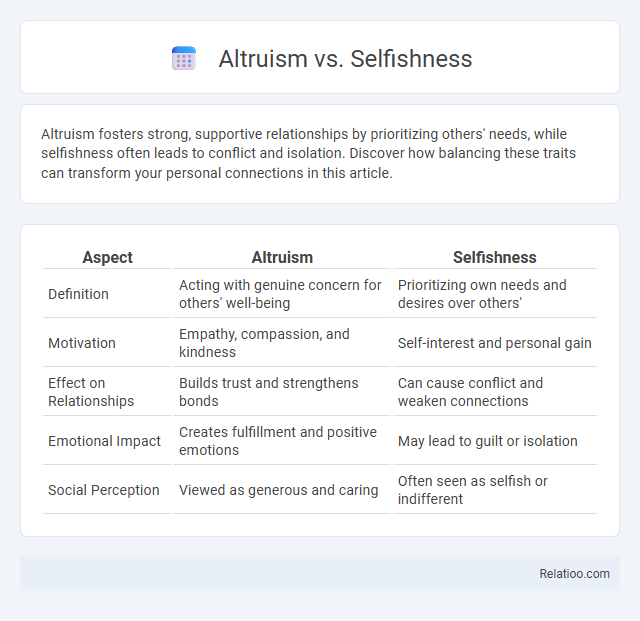Altruism fosters strong, supportive relationships by prioritizing others' needs, while selfishness often leads to conflict and isolation. Discover how balancing these traits can transform your personal connections in this article.
Table of Comparison
| Aspect | Altruism | Selfishness |
|---|---|---|
| Definition | Acting with genuine concern for others' well-being | Prioritizing own needs and desires over others' |
| Motivation | Empathy, compassion, and kindness | Self-interest and personal gain |
| Effect on Relationships | Builds trust and strengthens bonds | Can cause conflict and weaken connections |
| Emotional Impact | Creates fulfillment and positive emotions | May lead to guilt or isolation |
| Social Perception | Viewed as generous and caring | Often seen as selfish or indifferent |
Defining Altruism and Selfishness
Altruism is defined as the selfless concern for the well-being of others, often motivating actions that benefit others at a personal cost, while selfishness is characterized by prioritizing one's own interests and benefits over those of others. Kindheartedness, distinct from pure altruism, involves warmth and compassion that may inspire generosity without the complete self-sacrifice seen in altruistic behavior. Understanding these concepts highlights the spectrum of human motivations from self-centeredness to empathetic concern.
Historical Perspectives on Altruism and Selfishness
Historical perspectives on altruism and selfishness reveal evolving interpretations of human nature, from Thomas Hobbes' portrayal of selfishness as a fundamental survival instinct to Adam Smith's recognition of innate sympathy fostering altruistic behavior. Philosophers like David Hume argued that moral sentiments, including kindness and empathy, drive altruistic actions, challenging purely self-interested views. Understanding these historical debates helps you grasp how concepts of human motivation balance self-interest with the capacity for kindness.
Psychological Foundations of Altruism
The psychological foundations of altruism reveal complex motivations driven by empathy, social bonding, and evolutionary benefits that promote cooperative behavior. Your capacity for kindheartedness arises from neural mechanisms that reward prosocial acts, contrasting with selfish impulses rooted in self-preservation and personal gain. Understanding these dynamics helps clarify how altruism balances individual needs with the welfare of others in social contexts.
The Science Behind Selfish Behavior
Neuroscientific studies reveal that selfish behavior activates reward centers in your brain, such as the nucleus accumbens, highlighting the evolutionary basis for self-preservation. Psychological research indicates that while selfishness can promote individual survival, acts of altruism and kindheartedness engage neural circuits linked to empathy and social bonding, like the mirror neuron system. Understanding these mechanisms helps explain the balance between self-interest and prosocial behavior in human interactions.
Cultural Influences on Altruistic and Selfish Acts
Cultural norms and values significantly shape altruistic and selfish behaviors, with collectivist societies promoting selflessness and community support, while individualistic cultures often emphasize personal achievement and self-interest. Research indicates that cultures with strong social cohesion and interdependence encourage acts of kindness and cooperation, whereas competitive environments may foster selfish tendencies. Understanding these cultural influences helps explain variations in prosocial behavior across different social contexts and highlights the role of upbringing and societal expectations in moral development.
Altruism vs Selfishness in Everyday Life
Altruism and selfishness represent opposing motivations influencing daily decisions, where altruism drives you to prioritize others' well-being often at personal cost, while selfishness focuses on maximizing personal benefit sometimes at others' expense. In everyday life, altruistic behaviors foster trust, cooperation, and social harmony, enhancing communal relationships and long-term benefits. Understanding the balance between these impulses helps you navigate social interactions and promotes healthier, more empathetic communities.
Ethical Implications of Altruistic and Selfish Choices
Ethical implications of altruistic and selfish choices reveal how altruism promotes social cohesion by prioritizing others' welfare over personal gain, fostering trust and collective well-being. Selfishness often challenges moral frameworks by emphasizing individual benefit, which can lead to social tension and ethical dilemmas when personal interests conflict with communal values. Your decisions to act altruistically or selfishly directly impact ethical standards within your community, shaping the balance between self-interest and the greater good.
Altruism, Selfishness, and Human Evolution
Altruism plays a critical role in human evolution by promoting cooperative behavior that enhances group survival and genetic propagation, contrasting with selfishness, which prioritizes individual gains often at the group's expense. Your understanding of altruism reveals how acts of selflessness contribute to complex social structures essential for thriving communities, while selfish tendencies can disrupt these bonds. Kindheartedness, as a manifestation of altruistic impulses, reinforces social cohesion and increases the likelihood of mutual support in human populations.
Can Altruism and Selfishness Coexist?
Altruism and selfishness can coexist within your behavior, as human motivation often involves a complex blend of self-interest and concern for others. Altruistic actions may be driven by underlying personal benefits such as emotional satisfaction, social approval, or reciprocal help, blurring the line between pure selflessness and selfishness. Understanding this interplay allows you to recognize how kindheartedness emerges from balancing your own needs with genuine care for others' wellbeing.
Fostering Altruism in a Self-Driven World
In a self-driven world where individual goals often dominate, fostering altruism requires intentional effort to prioritize empathy and collective well-being over personal gain. You can cultivate altruism by practicing active listening, volunteering, and promoting community-oriented values that counterbalance selfish tendencies. Emphasizing kindheartedness as a bridge between self-interest and altruism encourages harmonious social interactions and sustainable relationships.

Infographic: Altruism vs Selfishness
 relatioo.com
relatioo.com